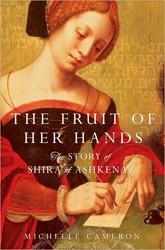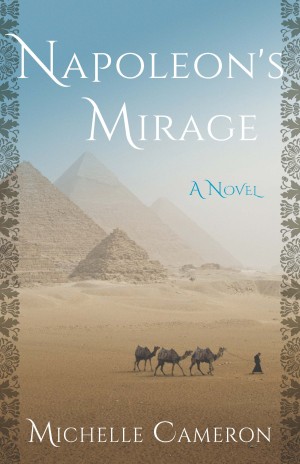In her new historical novel Beyond the Ghetto Gates, author Michelle Cameron fashions a story that is both timeless and deeply rooted in the social, political, and religious mores of its time. Set in the Jewish ghetto of Ancona, Italy in 1796 – 1797, during Napoleon’s march through Europe, the book follows two prominent families — the Morpurgos and the d’Anconas. The Morpurgos are the wealthiest family in the ghetto, with a history of leadership, business partnerships across Italy, and — important for our story — financing the world-renowned Ketubah workshop of the d’Ancona family.
The Jews were able to lead active religious lives within the ghetto, free to practice as they wished, whereas when they ventured outside they had to endure political and social constraints because of their Jewish identity. Forced to wear the ironically sunny yellow scarves and/or caps when they stepped beyond the ghetto walls, Jews were routinely subjected to abuse, ranging from the passive-aggressive behavior of Christian vendors who often ignored their Jewish customers to the blatant insults of those who called them vermin and Christ killers.
Cameron introduces us to the wealthy teenaged socialite Dolce Morpurgo and to Mirelle d’Ancona, daughter of the scribal art master Simone d’Ancona. Mirelle has been deemed a “problem” by the local rabbi because she wants to be a bookkeeper in her father’s business, which she has helped stabilize due to her business acumen. The ghetto rabbi has declared that a young woman of marriageable age is forbidden from working in a male environment. Should she continue this activity, the rabbi would decree a boycott of the workshop and declare that any Ketubahs they sold would be unkosher.
Mirelle feels restive and displaced. Banished from her family’s Ketubah workshop and pressed into acquiring skills to become a good wife and mother, she accepts an invitation from her childhood friend and confidante Dolce Morpurgo to join her and her father on a trip to Vienna, where the elder Morpurgo will be conducting business while Dolce and Mirelle attend a masked ball. For the first time, the young women venture outside the ghetto without their yellow identifiers and are able to engage with society as equals. At the masked ball, their own hiddenness, while not unlike the other attendees, was uniquely separate since they are also masking their Jewish identity.
Two of Napoleon’s soldiers, also childhood friends and one of whom is Jewish, and who happen to be stationed with a French battalion in Vienna, also attend the ball. Through a series of unusual circumstances, the soldiers and the two young women meet, never expecting to see one another again. Yet shortly after the masked ball, a troop of French soldiers is stationed in Ancona to quell unrest precipitated by an epiphany of a local Christian woman who attests that a portrait of Mary wept and smiled at her during a church service. Word of that event quickly spreads to other communities and leads a group of extreme Christians to vilify and attack Jews. At the same time, Napoleon orders that the ghetto walls be taken down, frees the Jews from their yellow symbols of derision, and declares that Jews are now full citizens. Jews are still being attacked and killed, while politically and socially they have suddenly become citizens. Empowered by the newfound freedom granted to her community, Mirelle steps outside her religious and political confinement, as her family bears incalculable loss.
The story highlights the persistent issues of identity, class, social expectation, and stereotypes. Cameron’s characters evoke empathy especially as the reader clearly senses that emancipation is leading to disaster and chaos. Ultimately, however, Mirelle’s family and the workshop survive, and while the families and community of our story and Europe are changed after Napoleon, we are left with hope that healing is possible for both Europe and for the community that Cameron has created for us.
Rabbi Reba Carmel is a freelance writer whose work has appeared in Jewish Currents and The Jewish Literary Journal and other publications. Rabbi Carmel is a trained Interfaith Facilitator and has participated in multiple Interfaith panels across the Delaware Region. She is currently in the Leadership Training Program at the Interfaith Center of Philadelphia.



